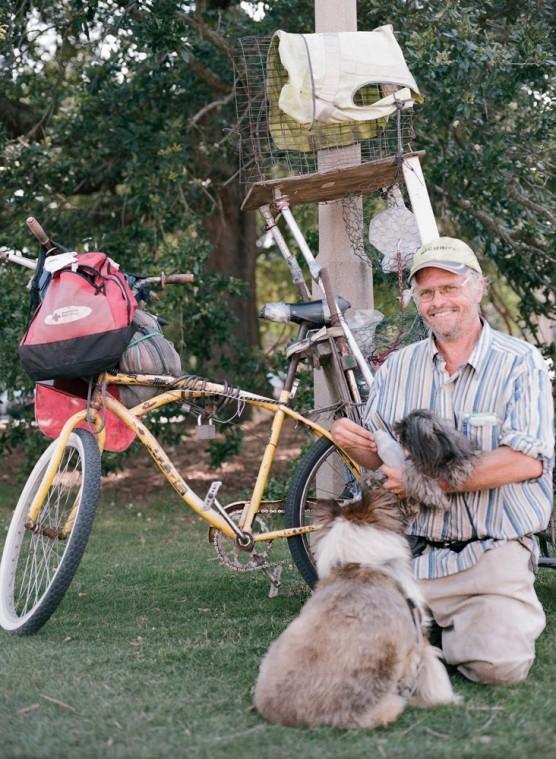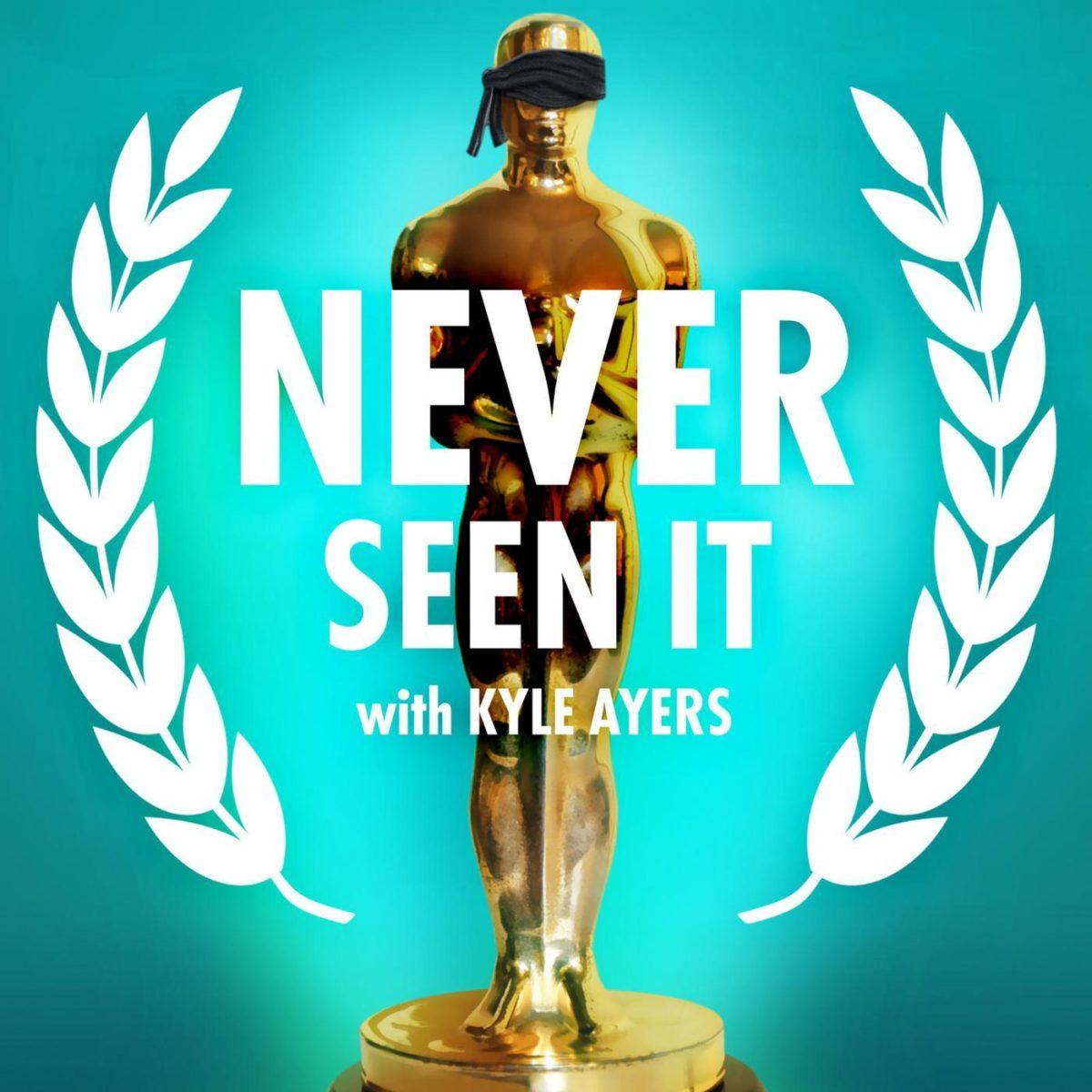Jefferson Orwell Opal and his bicycle aren’t a new sight to the campus. He pedals his way through the heart of the ground each week, attracting curious stares and welcoming smiles along the route.
Opal, 1981 alumnus, is no ordinary man, and he rides no ordinary bike — it holds his two dogs, any interesting treasures Opal finds on his routine 25-mile trip around Baton Rouge and a reputation that has made him an icon.
On a warm summer afternoon, he leans against his homemade bi-pedal contraption — a bicycle frame adorned with a rickety crate for Ringo, a 4-year-old Shetland sheepdog, and Cayla, a 3-year-old shih tzu-yorkie mix — and begins to tell the story of how he became the “bicycle man.”
His story is dominated with his personal philosophy and his efforts to achieve a kind of zen. As he talks, people stop to stare and take pictures of the man whose legend towers over him, much like the collection of wood and wire he’s become known for.
“I love it,” Opal says about the attention he receives from his bike. “It always gives me something to look forward to. I always get a kick out of people smiling and laughing and turning on their video cameras.”
While Opal pauses between words, smiling blissfully, a sense of the real “man on the bike” begins to emerge.
Like his bike, Opal is a combination of assorted treasures he has come across in his 55 years of life. He lives based off wisdom and knowledge from the books he’s read, people he’s talked to or his personal experiences.
Every nugget of truth he doles out has come from a book or is accompanied by a story. Opal says he reads six books at a time, but he will usually only finish one of the six and uses the others as a way to avoid spending too much time on any one book.
In addition to books, Opal relies on his religious experiences for wisdom and guidance.
Opal describes himself as a “very theist” man. Although raised by atheist parents, Opal says he wasn’t aware of the household’s lack of faith until his 20th birthday when his parents decided to tell him. This withholding allowed Opal the freedom to explore different religions and pick a belief that suited him, he says. As a result, Opal says he now borrows ideas and concepts from a number of religions including Buddhism and Hinduism.
His name is a testament to his way of living and the influence of religion and history over him. Born Bruce Paul Johnston, Opal originally changed his name in 1987 to Arjuna Lynn Opal. The name Arjuna was picked because of a favorite character in the Buddhist scripture Bhagavad Gita.
As he begins to describe the passage that influenced his name, Opal must first stop to hold back a tear. He explains that Arjuna was a warrior who was afraid to go into battle because he was fighting against people he knew. Then, Opal says, God appeared to Arjuna in the form of Krishna to comfort the frightened man.
“There has never been a time when you and I and the kings gathered here have not existed, nor will there be a time when we will cease to exist,” Opal says, reciting the verse seemingly at ease before continuing the explanation of his name.
Despite his love for the character and its influence over him, Opal says he didn’t keep his first name because his family and friends had trouble pronouncing it. Instead, he eventually settled on Jefferson Orwell Opal. This name was inspired by two of his heroes, Thomas Jefferson and George Orwell. He kept the name Opal, which was inspired by his birthstone.
Opal says, in addition to Jefferson and Orwell, he also admires characters like Buddy Roehmer and Ronald Reagan, who have no problems socializing with others or talking to people. He says he could never reach that level of openness and amiability; but Opal, a friendly man, quick to discuss even sensitive, personal issues, brings up his former social disorder with only slight hesitation.
Growing up, Opal says he had a diagnosable case of chronic anxiety neurosis that made him self-conscious and ensured it would be difficult to socialize with strangers. At rest, Opal says his neurotic brain was like a normal person’s brain at work, full of activity.
According to the Anxiety and Depression Association of America, anxiety disorders are the most common form of mental illness and affect 40 million adults in the United States ages 18 and older. However, these disorders, which can result from genetics or life events, are treatable.
After graduating first from LSU with a degree in computer science and then from the University of Louisiana at Lafayette with his master’s degree, Opal moved to California to get a job as a computer programmer. There, Opal says he overcame his anxiety by constantly pushing himself to interact with people.
“I sort of took the opportunity to forcefully push [the chronic anxiety] out of my mind real quick by being just very nervy by asking a bunch of women for dates and stuff like that, just crazy stuff, hugging people and just pushing [to get rid of the anxiety],” Opal said.
Eventually, Opal says he was able to get rid of his anxiety and achieve a state of mind in which he no longer had any inhibitions or self-consciousness.
“I was not really a human being. I was superhuman,” Opal says of his achieved state. “Emotionally, it was impossible for me to feel embarrassed. I had direct control over my emotions. I could will into my mind, anytime I wanted to, these heavenly, beautiful feelings of love for everybody … I could read people’s emotions incredibly vividly. It’s like people were different colors.”
Opal says this state of mind lasted 38 days. As with everything else, Opal sought further explanation in a book, saying he found a man, George Gurdjieff, who wrote about this rarely experienced state.
“People who attain this state, their first reaction is astonishment that they had previously regarded themselves as sane,” Opal says. “They feel like the first time in their life they really see. In my ordinary waking state, I’m always having to deal with, it feels like, these puppet strings on me. … And when I was in that state of mind, the Gurdjieff people call if ‘self-remembering,’ I had none of that.”
Ever since, Opal has been working to achieve this state again in a number of ways. One technique he’s tried is picking up a phone book, calling a random business and asking a question like, “What time are your hours?” Opal says after a couple of phone calls, this random interaction gets rid of any nervousness he may be experiencing.
Another source of constant interaction is also the thing Opal has become most known for.
Biking around Baton Rouge puts Opal in contact with strangers and has brought him many opportunities. He rattles off television and magazine interviews he’s had, people who have given him everything from clothes to a roof over his head and even notes how the bike has brought him run-ins with police and security personnel who sometimes find trouble with him leaving his bike and dogs outside of buildings.
Opal says he’s gotten used to this everyday socialization.
“When someone waves at me, I have to make a conscious effort not to wave back,” Opal says of his changed behavior toward strangers. “It used to be the other way around. If I didn’t recognize them, ‘Should I be waving at this person? I don’t know you.’”
Even people Opal hasn’t personally met take notice of the curious man.
Winnie Netters, LSU gatekeeper at the Dalrymple Drive booth on campus, says she is used to seeing Opal every day, though she only saw him once during the summer.
She says she’s afraid the dogs aren’t being fed properly or could face danger on the bike.
“I don’t like the way the dogs are being treated,” Netters says about the man, sharing a concern Opal said he has often received. “It’s a form of abuse.”
Other gatekeepers have only heard tales of the “man on the bike.”
Capt. Cory Lalonde, LSU Police Department spokesman, says students will often call the police if they see a suspicious person on campus. If visitors to campus are arrested, campus policy is to ban them from the University. However, Lalonde said LSUPD hasn’t had any problems with Opal that would warrant this type of action.
In fact, most of Opal’s trips take place off campus.
His three-hour bike rides take him from his apartment in Central to the LSU campus. He’ll make stops along the way at Burger King to read the paper or Books-A-Million to browse for books. The routine, which began as a way to get exercise, has been the catalyst for a number of personality changes.
Opal mentions his laugh is naturally almost two times as loud as it used to be before he started biking. Opal also says he no longer has any negative feelings toward anyone.
“I like everybody,” Opal says. “Before I meet them, I like them.”
Opal explains his decision to start biking very simply.
In 2005, Opal says he decided he needed to exercise more, but he could never fully commit to an activity because it would mean leaving behind his two dogs, Ringo and Cayla.
About a year later, Opal came up with the idea for his now famous contraption. He says that at first it was hard for his dogs to get used to the pen on top of his bike. Opal says his dogs used to half-sit in the crate, half-stand on his shoulders as he rode. But eventually the dogs became used to the contraption and now calmly lay in it until Opal lets them out.
He says many people, like Netters, have questioned the dogs’ safety. Some even go so far as to call the police on him, Opal says. He says he’s annoyed these people question his dogs’ safety, assuring that takes good care of them and reasoning that anyone who has problems with the way the dogs are handled should speak to him directly.
The bike is what made him famous, but Opal doesn’t remain on the subject for very long. Instead, Opal continues to bring up the things he’s read about in books or knowledge he’s picked up from meeting people at bars.
Today, Opal holds a variety of jobs (he estimates around six). His main source of income involves buying secondhand books and reselling them on the Internet. Opal guesses his collection is around 350 books. Another job involves taking care of the property where Opal lives and in exchange, Opal is allowed to stay there without paying rent.
In his time spent reselling books, Opal says he has learned which books sell and which don’t.
As with everything else in his life, Opal takes these lessons and applies them directly to his lifestyle. He says his biggest sellers are religious books, but he distinguishes those books that preach from the books that aren’t as heavy-handed. He imagines people prefer the latter because those books “exuded warmth.”
Opal appreciates his citywide fame. He’s grateful with the interaction it has allowed him and he says he wishes he could market his canine contraption to children, like himself, who experience anxiety disorders or have trouble interacting with others.
All the while, Opal continues to smile, denying rumors that he’s an LSU professor and sharing everything that has led up to this point in his life.





